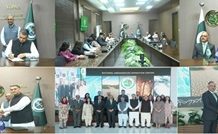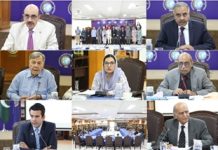There are two clear paths before us-militancy and non-violence; one leads to hopelessness and self-destruction and the other to progress and modernity
The tragic episode of Lal Masjid has injected a new ugliness into what seems to be emerging as a bitter conflict between Islamic militants and security forces. The violent confrontation in the capital has already produced some convulsive consequences in the regions bordering on Afghanistan and in the settled areas of the Frontier province. The latest reactions of the militants give one the impression that caution and good sense are the last things on their mind. It is time to ponder seriously the national security threat we face from within in the coming months and perhaps years.
On one level, the threat is not entirely from within but in an ideological and strategic sense linked to a transnational militant Islam with roots in Afghanistan and the Middle East. For decades Pakistan has played gracious host to militants and to absurdly grandiose strategic schemes, without reflecting for a moment on the adverse effects it had on state and society. Now is the time for truth, introspection and rational analysis: what harm have we done ourselves and how have we redefined our future direction?
We have done enough scapegoating and blame-shifting. We no longer have time or political capital to waste on this, but must come to grips with the evolving challenge to our national solidarity and internal peace.
Transfixed by the happenings in and around Lal Masjid last week, the public might have noted how far apart madrassa-educated students and clergy and the rest of society have drifted during the past three decades. They seem to have different ideals, feelings, world views and understanding of what is good for Muslims and Pakistan.
The madrassa network, fast expanding by taking over public spaces in and around towns, is not isolated. By offering care and education to the poor and marginalised sections of the most backward areas of the North, Frontier and southern Punjab, the madrassa has emerged as a relatively credible religious institution. This is especially so in the estimation of the conservative religiously orientated urban middle-class, which throws lot of money into it.
Judging from the way the vast majority of people in the street have interpreted the Lal Masjid operation and the worldview of the slain cleric and his associates, it seems that extremism is no longer confined to what we have tended to regard as ‘fringe elements’. An irrational, anti-modern and obscurantist mindset, with a conspiratorial twist on every thing that might matter in politics, is too apparent in every day conversation even among university graduates, mature professionals and government functionaries. What is more shocking is that ordinary people admire and sympathise with those who use fire arms and suicide bombs against our security forces.
I hope the emerging confrontation can be reversed, because if it is not, we would further weaken ourselves internally and become more vulnerable to our adversaries. An objective judgement on those who resort to violence against state and society does not require mental gymnastics. By taking up arms and glorifying murders, whatever name or title you might prefer to give them, they cannot do any good to Islam, Muslims or Pakistan.
We have just begun to taste what extremism and violence can mean when terrorists win social approval and religious authenticity. Muslims in the larger Middle East region have responded to humiliation, defeat, disempowerment and loss of dignity mainly through armed struggle. Palestine for the past sixty years, and currently Afghanistan, Iraq and other simmering internal conflicts speak volumes about how uncritically the majority of Muslims have gloried in reactive violence, not only as just but as the only effective way of getting wrongs righted.
Thirty years of academic experience in this field have made me sceptical of religious, moral and political justifications of, and the efficacy of, violence. We have never explored the alternative of non-violence, as many other societies have done to win their struggles. The most prominent example is Martin Luther King’s, who transformed the civil rights movement through non-violent means, and achieved remarkable success. King was inspired by the thought and practice of Mahatma Gandhi, who has left a great example for the peoples of the subcontinent.
The logic of violence is self-defeating and self-destructive; it leaves no winners, but only generations of disorientated and misguided men and women. We have millions of them with us, a legacy of our follies in the Afghan wars. It is very difficult and even risky to argue against violence and violent religious, sectarian and ethnic groups, but for the sake of humanity and in the interests of Muslims and Pakistan, it has to be done.
Serious disagreement does exist on questions of power, legitimate government, constitutional action, rights violations and global justice. No doubt the only way to address them all is through legal, peaceful and non-violent means. This is a course that our religious and ethnic groups have refused to explore.
But one has to take into account not only the issue of immorality of violent means but also the reality of modern states. The age of political romanticism about armed struggles and revolutions is long past, and there is no point in living in illusion. The only meaningful change would be incremental in nature, but can be accelerated through political consensus and collective social energy.
We have yet another chance to reshape Pakistan’s society according to a modernist, progressive vision. Let our extremist brothers and sisters know that a moderate, liberal, democratic and forward-looking Pakistan would be a better place for Muslims and other citizens than a sectarian, strife-stricken and poverty-ridden Pakistan. There are two clear paths before usmilitancy and non-violence; one leads to hopelessness and self-destruction and the other to progress and modernity. Let us employ reason and knowledge to make our choice for progress.
The author is a professor of Political Science at the Lahore University of Management Sciences.












